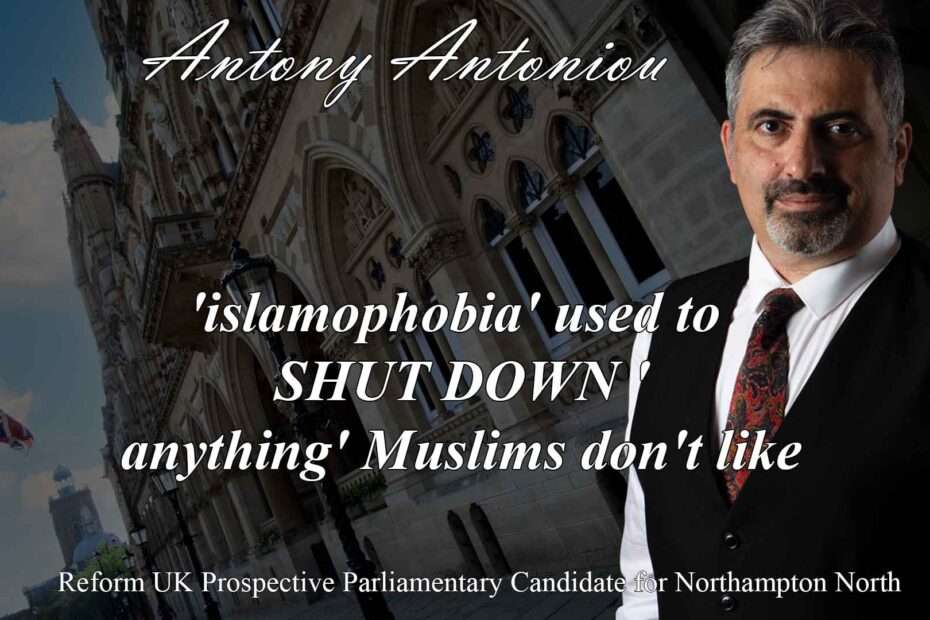‘Islamophobia’ used to SHUT DOWN ‘anything’ Muslims don’t like
Islamophobia: A Tool to Silence Criticism?
The Accusation of Islamophobia Stifling Debate
A new report from the Policy Exchange think tank claims that the term ‘Islamophobia’ is being exploited as an excuse to shut down debate and criticism of certain Islamic practices and beliefs. The report cites several instances where the accusation of Islamophobia has been levelled against individuals who have voiced concerns or critiques related to Islam.
One such example involves the Labour Muslim Network criticising Prime Minister Rishi Sunak for urging Labour MPs to call on Hamas and Hezbollah to de-escalate the situation in the Middle East. The group claimed that Sunak’s remarks were “clear Islamophobia” and “dangerous for the safety of Muslim officials and communities.”
Conflating Race, Religion, and Bigotry
Stephen Evans, the CEO of the National Secular Society, believes that the term Islamophobia is problematic because it conflates race and religion. “Islam is a religion, not a race,” he argues, “So that’s problematic.” Furthermore, Evans contends that the term blurs the line between criticism of Islamic beliefs and bigotry towards Muslims.
“People of all faiths and none should be protected from discrimination and hostility,” he asserts, “but ideas and beliefs have to be open to criticism and ridicule.” The vagueness of the term Islamophobia, according to Evans, allows it to be weaponised to shut down debate, criticism, and even offensive speech directed towards Muslims, regardless of whether the speech targets the religion itself or its adherents.
Accusations of Islamophobia and Their Consequences
The report highlights several instances where individuals have faced severe consequences for actions or statements deemed Islamophobic. For example, Trevor Phillips, a former chair of the Equality and Human Rights Commission, was suspended from the Labour Party after commissioning a poll about the attitudes of British Muslims.
Amanda Spielman, the former head of Ofsted (the Office for Standards in Education, Children’s Services and Skills), was labelled Islamophobic for drawing attention to external pressure faced by schools from groups opposing Relationships and Sex Education (RSE) lessons.
In another striking case, a GCSE student was disqualified from an exam for criticising the Islamic practice of non-stun slaughter (halal slaughter) in a Religious Education paper, an act that should be considered a legitimate exercise of free expression.
Chilling Effect on Free Speech
Evans argues that the term Islamophobia makes open and honest conversations about Islam’s impact on public and political life more difficult. “People will not want to speak up on things they care about, things they feel deeply about, if it could lead to an accusation of racism,” he warns.
This chilling effect on free speech is particularly concerning when it comes to discussions around Islamism and extremism. As Evans points out, extremists could exploit the accusation of Islamophobia to effectively control any discourse on these topics, shielding themselves from criticism.
Double Standards in Religious Criticism
The report also highlights an apparent double standard when it comes to criticising or mocking different religions. While Christianity and other faiths are often subject to criticism, and even satirical portrayals in popular culture, there seems to be a greater hesitancy to level similar critiques at Islam.
The example of a teacher still in hiding for showing a cartoon of the Prophet Muhammad is cited as evidence of this disparity. While some labelled the act Islamophobic, Evans argues that these accusations effectively equate Islamophobia with blasphemy, applying a religious standard to non-Muslim communities.
Potential Government Action and the Threat to Free Speech
The report’s findings raise concerns about the potential impact on free speech should the definition of Islamophobia adopted by the Labour Party and several local councils be implemented by a new government. Evans warns that this could lead to a “massive chill on free speech and on the right, frankly, to criticize a religion.”
As the debate around the boundaries of religious criticism and the appropriate use of the term Islamophobia continues, the report serves as a stark reminder of the potential consequences for open discourse and the fundamental right to freedom of expression.
Summary
• A new report claims the term “Islamophobia” is being exploited to shut down criticism and debate about Islam
• It cites examples where accusations of Islamophobia have been made against those critiquing Islamic practices or beliefs
• The term conflates race with religion, and criticism of ideas with bigotry towards Muslims, according to the National Secular Society CEO
• Several people have faced severe consequences like suspension or disqualification after being labelled “Islamophobic” for legitimate critiques
• There is a “chilling effect” on free speech as people fear being accused of racism for discussing Islam’s impact
• The report highlights a perceived double standard – Christianity faces more open mockery compared to Islam
• Accusations of Islamophobia are used by some to effectively mean “blasphemy” against Islamic teachings
• Concerns raised that if a broad definition of Islamophobia is adopted by the government, it could massively restrict criticism of Islam
• The report underscores the tension between religious criticism and the fight against anti-Muslim bigotry

